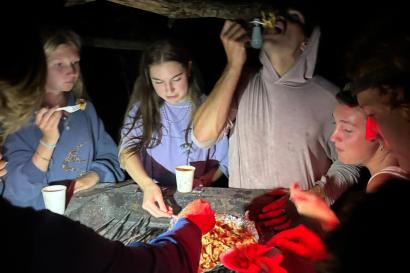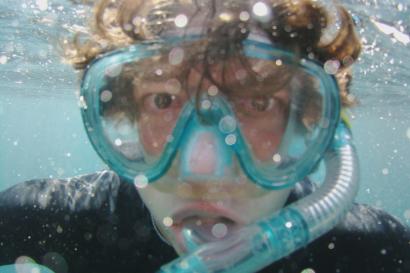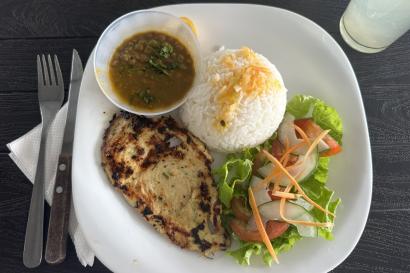One of the adventures that has been on my bucket list for YEARS is to visit the Amazon Rainforest. Just one week ago, on April 26th, I fulfilled that dream—I'll spend the next 1,000 words trying to describe the incredible awe I felt throughout the experience, but truthfully, I cannot find any words that successfully express this one-of-a-kind adventure.
To give a sense of the remoteness of the Tiputini Research Station (our destination, run by University San Francisco de Quito), I'll begin by describing the travel experience. We began our trip at 5 a.m. in front of the IES Abroad Center in downtown Quito, whereupon we drove to pick up the remaining students at USFQ before heading to the UIO airport. After waiting for a little over an hour, we boarded our plane and took a small 26-minute hop to Coca, Ecuador—it's got to be one of the shortest plane rides in the world. Once in Coca, a bus took us to a hotel where we boarded a boat and sailed down the Napo River to the site of a petroleum company (Repsol). I'm not allowed to talk at all about my experience there (we were not allowed to take any photos), save to say that we took another bus ride from there to the Tiputini River, where we boarded yet another boat. After about one hour on that boat (and nine hours since leaving the IES Abroad Center), we finally arrived at the Tiputini Research station around 2 p.m.
As we would soon find out, there are a few perks of living in such a remote location, far from the constant flickering of Quito's city lights. For example, you can leave your belongings in the common areas without worrying about someone stealing them...because NOBODY else lives within hours of the site. Next up is the lack of internet access—you can decide for yourself if that is a positive or negative, but I believe it made the experience a lot more enjoyable, more solely focused on nature—especially the billions of insects buzzing throughout the night. Luckily, the buzzing didn't keep me from sleeping like I thought it would—I fell asleep each night as soon as my head hit the pillow. Was it the humidity, the constant hiking, or the insect orchestra? I like to think of the latter as my own personal concert. Although certainly loud, the insects sounded a lot more like music than I would've expected, helping me relax as I slowly lolled off to sleep. Electricity is also only available twice per day (between 7 a.m. and 10 a.m. and between 6 p.m. and 9:30 p.m.), keeping us from using our phones as anything other than cameras. And don't forget the cold showers! They’re honestly quite refreshing after a long day sweating, although I did have to play the hokey pokey one night to get myself to hop in without squealing. Last but certainly not least, the middle-of-nowhere quality of this sector of the Amazon Rainforest allowed us to stargaze every night without worrying about the effects of light pollution. And what's more is that we glimpsed the Milky Way in the night sky—right next to the Southern Cross!
Even with only four days in the Amazon, we refused to limit ourselves to just a couple of adventures. That first day, we went on a night hike along a trail that meanders adjacent to the research station, searching for insects and other small critters. Although we saw several tiny frogs and lizards, the most common sightings were of spiders. I never realized how many species off spiders exist, from banana spiders to spiders with giant horns and everything in between; we probably bore witness to 20 different species. The most exciting creature of the night, however, was the Tarantula—a spider roughly the size of an adult human hand! Day two brought us to two distinct nearby trails where we saw Chorongo Monkeys and many more spiders and listened to the distinctive calls of Guacamayas (Macaws). That day, we also climbed a 40-meter (120-foot) metal tower that's used for observations of primates living in the area. From that vantage point, we gasped in awe at the circling vultures, the sprightly, green parrots and a gorgeous Toucan squawking to a nearby mate. With the assistance of our guide, we witnessed the exquisite structural beauty of these animals through a heavy-duty telescope. We then rounded out the day by oohing and ahhing at the three shooting stars that made a brilliant appearance in the night sky.
After the excitement of day two, we didn’t know how day three could top it, but luckily, Pachamama knew just what we needed and showed us the path to a beautiful, serene lake in the middle of the jungle where we saw playful Chorongo y Ardilla (squirrel) Monkeys and the Stinky Turkey during our half-hour canoe ride. Then, after lunch, we made our way down to the Tiputini River to swim amongst the Cayman, Pink River Dolphins, and Anacondas...we may not have seen these creatures, but it was fun to imagine them lurking under the water's surface during our mid-afternoon float. Tears flowed (almost) that night as we washed off our rain boots and prepared to say goodbye to the lush tropical rainforest living and breathing all around us. As we headed back to our cabins for our final night in the Amazon, monkeys swung over our heads just like in the movies, except this adventure was REAL.
On day four, we waved goodbye to our fellow primates as we floated off down the Tiputini River to begin the 12-hour trip back home, the research station disappearing in the distance. As I said before, I really can't describe the immensity of the forest or the incredible freedom I felt experiencing complete darkness in the middle of the Amazon because it all sounds exaggerated, but believe me when I say the awe will stay with me forevermore.

Julianna Connelly
<p>I love writing, specifically about the relationship between humans and the environment. Not only have I written a number of self-help articles, but I have also written (and plan to write many more) poems about this crucial topic. Because the environment is very important to me and creative writing is one of my passions, I find that putting the two together keeps me happy, satisfied, and feeling both empowered and capable of changing other people's opinions about their relationship to the world around them.</p>








